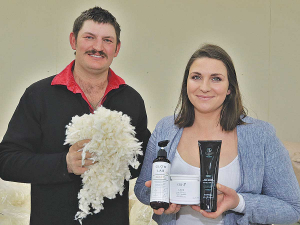Wired for Science: Understanding the feeding habits of mealybug
Fussy children might be frustrating, but fussy mealybugs could help protect the New Zealand wine industry from grapevine leafroll-associated virus 3.
 Goughs Bay sheep farmers George and Emma Masefield with wool and beauty products containing Keraplast keratin.
Goughs Bay sheep farmers George and Emma Masefield with wool and beauty products containing Keraplast keratin.
A Lincoln-based wool products company believes it offers a glimmer of hope against the increasing negativity currently saturating New Zealand’s strong wool industry.
Keraplast Manufacturing processes strong wool into natural keratin proteins for the booming global nutraceuticals market. Keratin is an essential component of hair, finger and toenails, and skin. The company sells its keratin products as an ingredient for use in health (wound treatment), and skin, hair and nail beauty products world-wide.
Keraplast general manager Paul Sapsford says a recent innovation involves a bioactive keratin product that’s taken in tablet or drink form to “supercharge” the body’s production of collagen, promoting wrinkle reduction and supporting hair follicle and nail strength.
The company recently signed an exclusive agreement with AIDP Inc that will distribute Keraplast Natural Innovation products into United States and Canadian markets.
“One of the key promotional tools we use to tell the Keraplast story is our strong connection with New Zealand wool growers, where we introduce a customer to a single farming family,” Sapsford says.
“The customer can then work with that farm for promotional purposes, showcasing real people and the natural way wool is grown on what are often very scenic properties in New Zealand.”
He says the company’s farmer suppliers are on board with the idea and are great ambassadors for New Zealand wool products.
“We can guarantee customers that the keratin in their specific products is made only from that farm’s wool.”
Sapsford claims this story of connectedness – from farm to end user of the health or beauty product – is a very attractive proposition and showcases New Zealand farmers to the world in a very personal way.
“The link from farm to the end customer has worked very well. Nutraceutical sales are increasing, with substantial opportunity for expansion.”
Sapsford believes the success of Keraplast is good news for the New Zealand strong wool industry, which is in serious decline with record low prices for coarse wool.
In July, the Government released a new plan to revitalise the struggling strong wool sector developed by the Wool Industry Project Action Group. Among other things, it called for innovative technology and research to identify high value uses for wool that reduce reliance on simply providing bulk coarse fibre for the likes of the carpet industry.
“Given the amount of wool we buy each year (up to 80 tonnes), we will never be able to single-handedly rescue the New Zealand strong wool industry,” Sapsford admits.
“However, our success and the scientific innovation behind it is exactly what the Government and our industry is looking for. The great thing is that we’ve been in this innovative space for more than 20 years and we keep finding new ways to add value to this excellent and unique wool product.”
The company says it has secured more than 180 patents for its unique processes and end products.
“It’s this continuous development and innovation that has seen Keraplast become one of the bright lights in the strong wool industry,” Sapsford adds.
Wonder wool?
Keraplast Manufacturing claims to be the world’s leading innovator of keratin protein technology, bringing the natural benefits of keratin protein to hair, wound and skin care, and nutrition.
The company is a combination of New Zealand and American research and innovation.
In the United States, Mississippi plastic surgeon Dr Robert Allen Smith observed unusual properties of keratin materials, such as hair, during the course of his surgical practice. This lead to the foundation of Keraplast in 1996.
New Zealand based research, supported by the New Zealand wool industry, identified industrial processes for the isolation of functional keratin proteins, and formed the company Keratec to commercialise these discoveries in 2001.
The two companies formed a partnership in the 2000s and then merged into one entity with an international patent portfolio involving 36 patent families.
All wool sourced by Keraplast is grown in New Zealand and all of the processing is done at Lincoln.
Changed logos on shirts otherwise it will be business as usual when Fonterra’s consumer and related businesses are expected to change hands next month.
Reflecting on the past year, Horticulture New Zealand chief executive Kate Scott says there has been a lot to celebrate.
Ministry for Primary Industries (MPI) Director General Ray Smith is giving a big shout-out to the horticulture sector, especially kiwifruit.
Early forecasts for New Zealand's apples and pears point to a standout season marked by exceptional fruit quality and high pack-out rates.
Tickets are now available for Beef + Lamb New Zealand’s (B+LNZ) Out the Gate, returning from 19-21 May 2026 at Te Pae, Christchurch.
Dairy Women's Network (DWN) is welcoming AgriHealth as a new partner.

OPINION: Here w go: the election date is set for November 7 and the politicians are out of the gate…
OPINION: ECan data was released a few days ago showing Canterbury farmers have made “giant strides on environmental performance”.